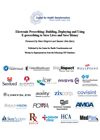
- Experiences prove that e-prescribing saves lives and saves money;
- The technology is inexpensive, and there are many partnerships that offer no-cost solutions to physicians and providers;
- There is a secure, nationwide infrastructure to exchange data;
- Many technical standards have been finalized to achieve uniformity of data transmission; and
- Certification by industry leaders ensures security, privacy and interoperability with hundreds of vendors and products.
This is not to say that challenges do not remain. There are significant, yet achievable steps to the widespread acceptance and use of e-prescribing:
- Bridging the gulf between the technology and incentives to its adoption;
- Implementing technology that meets the needs of physicians and providers;
- Finalizing remaining data standards; and,
- Allowing controlled substances to be prescribed electronically.
This white paper was written by representatives from twenty-two organizations, all members of the Center for Health Transformation, from IT vendors and physician groups to hospitals, health plans, pharmacy benefit managers (PBMs) and employers. These organizations are leading the way to transform health and healthcare through information technology.
Download Electronic Prescribing: Building, Deploying and Using E-prescribing to Save Lives and Save Money White Paper (.pdf, 520 KB).
Download from the eHealthNews.EU Portal's mirror: Electronic Prescribing: Building, Deploying and Using E-prescribing to Save Lives and Save Money White Paper (.pdf, 520 KB).
For further information, please visit:
http://www.healthtransformation.net
About Center for Health Transformation
The Center for Health Transformation is a high-impact collaboration of private and public sector leaders committed to creating a 21st Century Intelligent Health System that saves lives and saves money. For more information, visit www.healthtransformation.net.